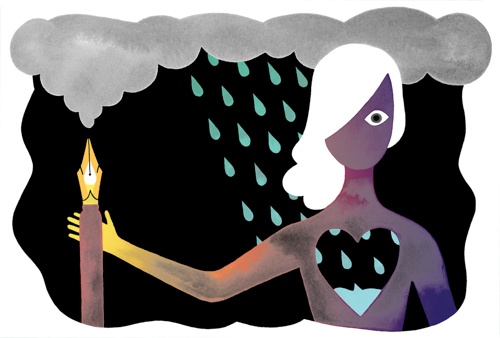 Illustration by Chris Kuzma.
Illustration by Chris Kuzma.
You Want to Travel With Him
It was hard to breathe in front of the fire. As a five-alarm blaze ravaged the abandoned R.S. Muir & Co. building at Parc and Milton, large plumes of smoke towered over the surrounding area, turning the sky grey. Donald Trump had recently won the US presidential election, and I was afraid to exhale. CTV News later reported that the fire department realized the building could not be saved—the only way to gain control of the fire was to tear it down.
Drifting snow fell softly as the firefighters pressed on. It disappeared on contact, touching the empty, winding sidewalks and Victorian architecture of the McGill ghetto. I warmed myself by walking to Leonard Cohen’s makeshift memorial site, outside his home on rue de Vallières, near boulevard Saint-Laurent, just over ten blocks away. Our hometown hero had been dead a little over two weeks.
I first read Leonard Cohen’s poetry over twenty years ago, in the first edition of 15 Canadian Poets, an unwittingly ironic gift from my god-fearing Irish-Catholic grandmother.
“Perhaps a mind will open in this world / perhaps a heart will catch rain,” he wrote in “Style,” a poem that made the world seem magical. “Nothing will heal and nothing will freeze / but perhaps a heart will catch rain.” I loved him immediately. He opened up parts of my brain and body I didn’t know existed. He made everything seem volatile, full of hope and despair and peace and suffering, simultaneously possible and impossible. He created nihilist dreamers and romantic disciples set on revolution, teaching us that the most we could ever hope for was to delight in a state of gentle, violent becoming. If you were lucky, maybe you could thrive there. All you needed were the right words. After discovering Cohen, I began to carry a pen everywhere I went.
“Everyone who loves him goes through that phase,” Jason had said, a few hours before I walked by the fire. “The phase where you really, really love him.” Jason was one of my favourite English professors at Concordia, and one of my favourite poets, too. He and I had often talked about Cohen over the years. I talked about how indebted I felt to him, but also about how much he owed poets like us: no writer from Montreal can avoid comparison. We don’t stand on the shoulders of a giant so much as we stand in his shadow.
Cohen’s shadow followed me as I wound my way through the city, relying on muscle memory. I left Montreal for Toronto a few years ago, and this was the first time I’d visited since his death. I made my way from Jason’s office at de Maisonneuve and Mackay through the somewhat solemn, dimly lit McGill campus, where Cohen had gone to school. I wondered how my life would’ve been different had I chosen to go there instead of Concordia. I walked by the Word bookstore on Milton, where I used to take dates—where Cohen smiled down at me from the Let Us Compare Mythologies poster that hung on the store’s wall. I walked up past the fiery R.S. Muir & Co., onto the Plateau, and into the neighbourhood that will forever be associated with Cohen.
His house was on the southern edge of Parc du Portugal, a small park dedicated to Montreal’s Portuguese community. Cohen would have seen the small gazebo across the street every time he opened his front door, against which the city’s love and grief were now laid: palpable, tangible, itemized. Rows of dying bouquets. Boxes of tea and oranges, a nod to “Suzanne.” One stale bagel, possibly from Bagel Etc., which Cohen was known to frequent, left untouched by respectful pigeons.
After a parked car drove off, no one else remained in front of the house. The street was quiet. Despite having developed relationships based on my love for Cohen, I wanted to be alone when I paid my respects and said goodbye. I decided to add a note to the many already scattered around the memorial. But what could I possibly say? Could it ever be as good as what he might write for someone he had lost? I fumbled through my bag. My hand felt around again. And again. I didn’t have a pen. Even if the right words had come to me, I had no way to write them. I smiled to myself as my shoulders dropped, humbled and relieved.
Was the fire out yet? I didn’t know. But I felt like I could finally breathe.





